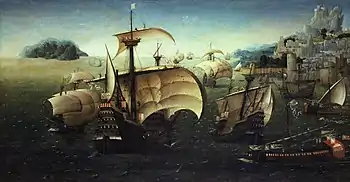Beatrice of Portugal, Duchess of Savoy
Infanta Beatrice of Portugal (Portuguese: Beatriz [bi.ɐˈtɾiʃ]; 31 December 1504 – 8 January 1538) was a Portuguese princess by birth and Duchess of Savoy by marriage to Charles III, Duke of Savoy. She was the Sovereign Countess of Asti from 1531 to 1538.
| Beatrice | |
|---|---|
.jpg.webp) | |
| Duchess consort of Savoy | |
| Tenure | 29 September 1521 – 8 January 1538 |
| Countess of Asti | |
| Reign | 3 April 1531 – 8 January 1538 |
| Predecessor | Charles V |
| Successor | Emmanuel Philibert |
| Born | 31 December 1504 Lisbon, Portugal |
| Died | 8 January 1538 (aged 33) Nice, Savoy |
| Spouse | Charles III, Duke of Savoy |
| Issue | Emmanuel Philibert, Duke of Savoy |
| House | Aviz (by birth) Savoy (by marriage) |
| Father | Manuel I of Portugal |
| Mother | Maria of Aragon |
| Religion | Roman Catholicism |
Life

She was the second daughter of Manuel I of Portugal (1469–1521) and his second wife, Maria of Aragon (1482–1517). Her siblings included King John III of Portugal and Holy Roman Empress Isabella. She was educated under the supervision of her governess Elvira de Mendoza.
In Villefranche-sur-Mer on 8 April 1521, Beatrice married Charles III, Duke of Savoy. He had succeeded as the Duke of Savoy since 1504, making Beatrice Duchess consort at the moment of her wedding.
Beatrice is described as beautiful,[1] brilliant, and ambitious. In 1531, she received as a fiefdom, from her cousin and brother-in-law, the emperor Charles V, the County of Asti which, on her death, was inherited by her son and permanently included on the Savoy's heritage.
In 1534, she welcomed Christina of Denmark, a ward of her brother-in-law the Emperor, on her way to her marriage with the Duke of Milan.[1] When Christina was widowed in 1535, the Milanese Count Stampa suggested a marriage between Christina and the eldest son of Beatrice, Louis, the heir of Savoy, in an attempt to protect Milan from Imperial sovereignty.[2] Beatrice supported the plan, and when Louis died, she suggested that her next son could replace him.[2] Nothing more was heard of this, however. In April 1536, Beatrice fled from the French conquest of Savoy to Christina in Milan in the company of two of her surviving children and the Shroud of Turin from Chambéry.[3] In May, she was able to visit the Emperor with Christina in Pavia, but without any political result.[4] She then lived as a guest with Christina in Milan, with whom she was good friends. In November 1537, Beatrice was escorted by the Imperial viceroy of Milan to the Emperor in Genova, but again, the meeting was without any result. She continued to Nice, where she reunited with her spouse. She died in Nice in January 1538.[5]
Children
Beatrice and Charles III had nine children:
- Adrian John Amadeus, Prince of Piedmont (19 November 1522 – 10 January 1523).
- Louis, Prince of Piedmont (4 December 1523 – Madrid, 25 November 1536).
- Emmanuel Philibert (Chambéry, 8 July 1528 – Turin, 30 August 1580); only surviving child and later Duke of Savoy.
- Catherine (25 November 1529 – May 1536).
- Marie (12 January 1530 – 1531).
- Isabella (May 1532 – 24 September 1533).
- Emmanuel (born and died May 1533).
- Emmanuel (born and died May 1534).
- John (3 December 1537 – 8 January 1538).
After the death of the childless Sebastian of Portugal (her grand-nephew), her son fought for his rights to become King of Portugal, however he failed and the throne was given to Isabella's son Philip.
Ancestry
References
- Cartwright Ady 1913, p. 87.
- Cartwright Ady 1913.
- Cartwright Ady 1913, pp. 117–118.
- Cartwright Ady 1913, pp. 116–117.
- Cartwright Ady 1913, p. 119.
- Stephens, Henry Morse (1903). The Story of Portugal. G.P. Putnam's Sons. p. 139. Retrieved 17 September 2018.
- Chisholm, Hugh, ed. (1911). . Encyclopædia Britannica. 9 (11th ed.). Cambridge University Press.
- de Sousa, Antonio Caetano (1735). Historia genealogica da casa real portugueza [Genealogical History of the Royal House of Portugal] (in Portuguese). 2. Lisboa Occidental. p. 497.
- Liss, Peggy K. (10 November 2015). Isabel the Queen: Life and Times. University of Pennsylvania Press. p. 11. ISBN 9780812293203.
- Chisholm, Hugh, ed. (1911). . Encyclopædia Britannica. 15 (11th ed.). Cambridge University Press.
- Chisholm, Hugh, ed. (1911). . Encyclopædia Britannica. 10 (11th ed.). Cambridge University Press.
- Ortega Gato, Esteban (1999). "Los Enríquez, Almirantes de Castilla" [The Enríquezes, Admirals of Castille] (PDF). Publicaciones de la Institución "Tello Téllez de Meneses" (in Spanish). 70: 42. ISSN 0210-7317.
- Henry III, King of Castille at the Encyclopædia Britannica
- Isabella I, Queen of Spain at the Encyclopædia Britannica
Bibliography
- Cartwright Ady, Julia (1913). Christina of Denmark, Duchess of Milan and Lorraine, 1522-1590. New York: E.P. Dutton and Company. OCLC 871060.
- Prestage, Edgar: Il Portogallo nel medioevo, in: Cambridge University Press - Storia del mondo medievale, vol. VII, pp. 576–610, Garzanti, 1999.
- Ricaldone, Aldo di, Annuari del Monferrato, Vol I and II.
- Testa D., Storia del Monferrato, seconda edizione ampliata, Tip.S.Giuseppe 1951.
- Vergano L.: Storia di Asti, Vol. 1,2,3. Tip.S.Giuseppe Asti, 1953, 1957.